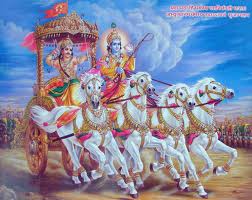Srimad Bhagavadgeeta :
Sunday, Mar 30, 2014.
Srimad Bhagavadgeeta :
Chapter- 8. ( Akshara-brapma-yogam )
Slokam-27 & 28. ( With these two slokam-s Lord concludes the above yogam viz.; chapter-8. )
Naite srtī partha janan yogī muhyati kascana, (27)
Tasmat sarveshu kaleshu yogayukto bhavarjuna.
Partha! ethe srti janan = Arjuna! Knowing these two paths;
Kascana yogi na muhyati = Never one yogi fall in unnecessary involvements of attachments;
Tasmat Arjuna! = Hence Arjuna!;
Sarvashu kaleshu = Always;
Yogayuktah bhava = Engage yourself ( mind ) in Paramatma.
Vedeshu yajneshu tapahsu caiva, (28)
daneshu yat punya-phalam pradishtam,
Atyeti tat sarvam idam viditva,
yogi paraṁ sthanam upaiti cadyam.
Vedeshu yajneshu = Study of Veda-s, Following of Yajnam-s;
Tapaasu daneshu ca eva = Performing Penance, Charity, by these;
Yat punya-phalam pradishtam = ( you ) receive, such rewards ( which the Sastras assure you );
Tat sarvam = Those things;
Idam viditva = (one ) knowing this;
Yogi atyeti = Yogi overcomes/surpasses;
Adyam param sthanam = The Supreme abode;
Upaiti ca = Attains.
Now the result of knowing the Vedic conclusion to this chapter and the previous chapter is being stated by Lord Krishna with the words vedesu yagnesu,tapahsu caiva danesu. vedesu is the study of the Rig Veda, the Yajur Veda, the Sama Veda and the Atharva Veda as well as all other Vedic scriptures. yagnesu is the performance of yagna or various Vedic ritualistic activities in propitiation tapahsu is engaging in tapasya or rigorous austerities and penance like extreme fasting danesu is giving charity and doing philanthropic works such as feeding the poor
All these four activities give great merit but whatever merits are assigned in the Vedic scriptures for these pious activities they are all eclipsed and surpassed by that liberated being who knows the glorious pre-eminent position of the Supreme Lord as revealed by Lord Krishna in these two chapters. Such a being transcends in their very existence. This means that the bliss in realising the ultimate reality of the Supreme Lord's paramount and exalted state in comparison makes the rewards appointed in the Vedas as insignificant as a blade of grass. To be a yogi or one perfecting the science of the individual consciousness attaining communion with the ultimate consciousness, is assuredly achieved by this transcendence and such a one assuredly attains the ultimate goal in association with the Supreme Lord.
The one who has understood and assimilated the truth regarding the purport to Lord Krishna's unequivocal answers to Arjuna's eight questions as well as the process of attaining it will never forget the Supreme Lord whether performing activities or not performing activities. Therefore it is stated in the Skanda Purana: Knowing the two paths which lead to the archi-adi the path of light, along with the process, the methodology and the implementation one will not be deluded in the knowledge of the supreme attainment.
One who following these two paths by knowledge of the pre-eminent paramount position of the Supreme Lord realises the brahman or the spiritual substratum pervading all existence which is more meritorious than even study of the Vedas, attains the eternal abode of the Supreme Lord in association with Him.
Thus Lord Krishna concludes this chapter stating the results of ascertaining the intrinsic meaning of the answers to the eight questions asked by Arjuna. The yogi or one perfecting the science of the individual consciousness attaining communion with the ultimate consciousness having devotion for the Supreme Lord eclipses all. Such a being fully realising the intrinsic truths revealed in the answers given by Lord Krishna to these eight questions and understands the absolute supremacy of the Supreme Lord surpasses in achievement all the pious merits of those who are devoted to study and reflection of the Vedas, those who perform ritualistic Vedic activities for rewards, those who engage in severe austerities and penance and those who give much charity to others. Such a yogi understands that material goals only lead to temporary rewards and that all meritorious activities performed with any attachment or desire assuredly propels one back into physical existence endlessly. The conclusion is that for such a yogi it is the Supreme Lord Himself that is the only goal and as He is the only goal such a one attains the Supreme Lords and has eternal association with Him in His transcendental abode in the spiritual worlds.
The talk on "Punar-Avarthana -rahitham ( No-Return ) and Punar-Avarthanam ( Return ), ends here.




Comments